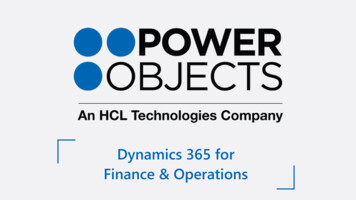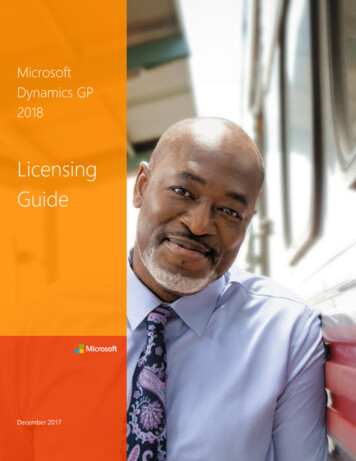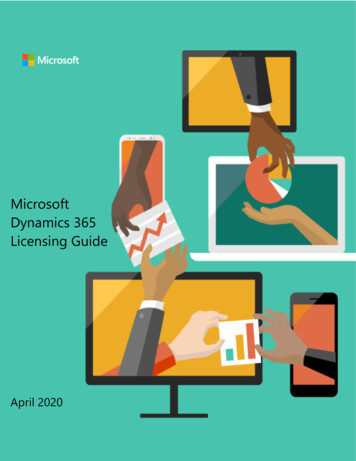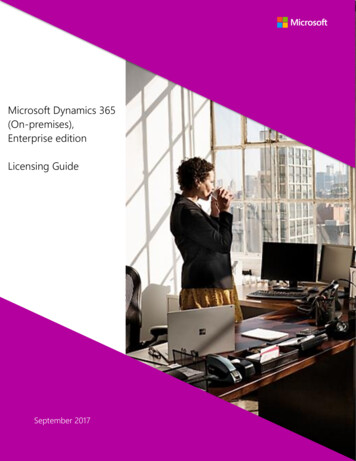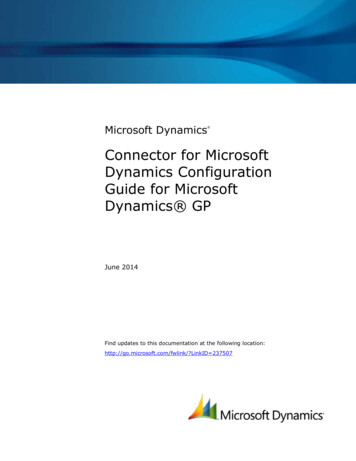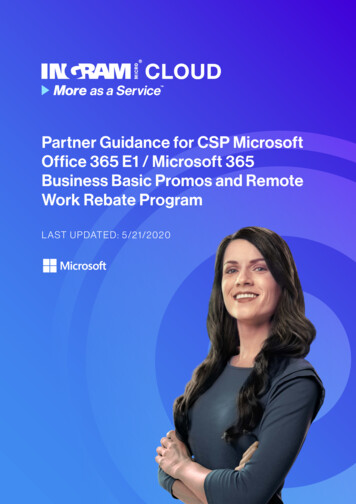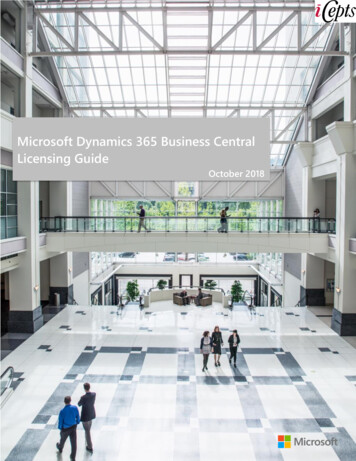
Transcription
Dynamics 365Microsoft Dynamics 365,Enterprise editionLicensing GuideDecember 2016The Microsoft Dynamics 365 Licensing Guide December 2016
ContentsIntroduction to Microsoft Dynamics 365 . 1Subscription Licensing Requirements . 1Microsoft Dynamics 365 Subscription License Types . 6Dynamics 365 for Team Members . 7Dynamics 365 Enterprise Edition Applications (or Apps) . 8Dynamics 365 Plans . 12Additional Services and Software . 13Device Subscription License . 15Default Subscription Capacities . 16Microsoft Power BI in Microsoft Dynamics 365 . 19Microsoft Dynamics 365 Add-ons . 19Dynamics 365 Support Policies. 24International Availability . 26Microsoft Dynamics Lifecycle Services . 27Licensing Programs . 27Free Trial. 29Existing Customers . 29Links for Additional Information . 29Appendix A: Team Members License Summary . 31Appendix B: Plan 1 Applications . 32Appendix C: Dynamics 365 for Operations Security Roles by User SL Level . 35Appendix D: Operations Customization and Licensing Requirements . 41Appendix E: Support Policies . 43The Microsoft Dynamics 365 Licensing Guide December 2016
Using This GuideUse this guide to improve your understanding of how to license Microsoft Dynamics 365. MicrosoftDynamics 365 evolves Microsoft’s current CRM and ERP cloud solutions into one cloud service with newpurpose-built apps to help manage specific business functions. Dynamics 365 apps are designed so theycan be easily and independently deployed. A customer can start with what they need, yet the applicationswork together so, as the business demands, the customer can adopt additional capabilities with ease.This document does not apply to Microsoft Dynamics NAV, Microsoft Dynamics GP, Microsoft DynamicsSL, Microsoft Dynamics AX 2012, or Microsoft Dynamics CRM 2016 or prior versions. This guide also doesnot apply to Microsoft Dynamic CRM Online, or Microsoft Dynamics AX online service. This guide is notintended to influence the choice of Microsoft Dynamics products and services. The examples presented inthis guide are illustrative. Microsoft reserves the right to review or update this document at any timewithout notice.Customers who are using Microsoft Dynamics CRM Online licenses today should refer to the MicrosoftDynamics CRM Online Licensing Guide for details on their entitlements and use rights, including benefitsderived from Dynamics 365 licenses. This document applies for users licensed with Dynamics 365 licenses.For help determining the right technology solution for any given organization, including the licenserequirements for a specific product or scenario, consult with your Microsoft account team or yourMicrosoft Dynamics Certified Partner.This guide does not supersede or replace any of the legal documentation covering use rights.Introduction to Microsoft Dynamics 365Microsoft Dynamics 365 is the next generation of intelligent business applications in the cloud. Dynamics365 unifies CRM and ERP capabilities by delivering new purpose-built applications to help managespecific business functions, including Dynamics 365 for Sales, Dynamics 365 for Customer Service,Dynamics 365 for Field Service, Dynamics 365 for Project Service Automation and Dynamics 365 forOperations. Designed to be personalized, enable greater productivity, deliver deeper insights and adaptto business needs, Dynamics 365 applications help businesses accelerate digital transformation to meetthe changing needs of customers and capture the new business opportunities of tomorrow. Note thatDynamics 365 for Sales, Dynamics 365 for Customer Service, Dynamics 365 for Field Service, andDynamics 365 for Project Service Automation may also be referred to as Plan 1 Business Applications.Dynamics 365 has two editions, Enterprise and Business editions. The Enterprise edition is optimized for250 employees and includes the capabilities of Dynamics CRM Online and Dynamics AX products thatexisted in market pre Q4CY16. The Business edition is optimized for 10-250 employees and includesDynamics 365 for Financials (currently known as Project Madeira) at launch with future expected sales andmarketing applications. This licensing guide will focus on the Enterprise edition. Please see here for theBusiness edition licensing guide.Subscription Licensing RequirementsInternal and External UsersWith Microsoft Dynamics 365, you must license each internal user who will access the service. However,access by external (third party) users is included with the subscription and does not require subscriptionlicenses (SLs) External users are users that are not an employee, contractor, or agent of the customer or itsaffiliates.The Microsoft Dynamics 365 Services Licensing Guide December 2016P a g e 1
In other words, end customers (customers of the Microsoft Dynamics 365 customer) do not require a SLto access Microsoft Dynamics 365 unless these users are accessing Microsoft Dynamics 365 clientapplications and graphical user interface (GUI). However, end customers may not use Microsoft Dynamics365 to manage any portions of their business. In this sense, the definition of external users does notextend to the customer or the customer’s affiliate’s contractors, vendors, or agents providing businessprocesses on the customer’s behalf.Please note you may not use Microsoft Dynamics 365 to provide business process outsourcing services toyour clients or customers.Microsoft Social Engagement, a service included as part of select Dynamics 365 licenses, does notdistinguish internal and external users. You must license external users as well as internal users who willaccesses services with a Dynamics 365 license.Note: Offsite vendors are considered external users only when their time is shared in between multiple customerorganizations (for example, IT support service vendors serving multiple customer organizations) and they are not inan employee-like relationship.Figure 1: Internal vs. external usersLicensing Requirements for Internal UsersYou may license access to the Microsoft Dynamics 365 by purchasing a Subscription License (SL) forevery internal user who directly or indirectly accesses the service.Dynamics 365, Enterprise edition has two types of SLs: User SLs are assigned on a “named user” basis, meaning each user requires a separate User SL;User SLs cannot be shared but an individual with a User SL may access the service throughmultiple devices. Device SLs are assigned to license a device. With the Plan 1 Business Application Device SL anynumber of users can use the licensed device with a shared login, such as ‘truck1@contoso.com’without the need for separate User SLs. Individual users cannot be tracked as they all share onelogin. Plan 1 device licenses are full devices – they include the same rights as the equivalent userlicense. With the Dynamics 365 Operations Device SL any number of users can use the licenseddevice with individual logins without the need for a separate User SL. The Operations device is alimited license with a subset of Operations capabilities.The User and Device SL grants users non-perpetual rights (with no buy-out rights) to the use of theDynamics 365 service. As long as you are current on your subscription payments and adhere to theProduct Terms and the Online Service Terms, you will have access to the most up-to-date version ofyour Microsoft Dynamics 365.The Microsoft Dynamics 365 Services Licensing Guide December 2016P a g e 2
Note: Only the user or the device requires a SL, not both. If the user of a device is licensed with a User SL, then thedevice does not need a Device SL. Likewise, if the device is licensed with a Device SL, then the user does not need aUser SL.Figure 2: Basic licensing requirements for Microsoft Dynamics 365The subscription licenses include access rights to the default Microsoft Dynamics 365 instancesincluded in the subscription account, and every additional Microsoft Dynamics 365 instance(production or non-production) associated with the same Azure AD tenant. For more information onAzure AD tenants, please see here.Figure 3: Accessing multiple instancesMultiplexingMultiplexing refers to the use of hardware or software that a customer uses to pool connections, rerouteinformation, or reduce the number of devices or users that directly access or use Microsoft Dynamics 365.Multiplexing does not reduce the number of SLs of any type required to access the Microsoft Dynamics365. Any user or device that accesses Microsoft Dynamics 365 —whether directly or indirectly—must beproperly licensed.Microsoft Dynamics 365 SLs are required for users or devices that directly input, query, or view data fromthe Microsoft Dynamics 365. Similarity, Microsoft Dynamics 365 SLs are required for users or devices thatinput data into, query, or view data from Microsoft Dynamics 365 through a pooling device. Pooledconnections use a non-interactive user account in Dynamics 365 that can access the system but only viathe web service layer. Internal users and devices accessing Microsoft Dynamics 365 data indirectly througha portal or via an API to a separate service such Microsoft Outlook must also be properly licensed,regardless of if they are set up as a Dynamics 365 user in the service. Internal users and devices access Microsoft Dynamics 365 data indirectly through a PowerAppmust still be properly licensed for Dynamics 365.The Microsoft Dynamics 365 Services Licensing Guide December 2016P a g e 3
Any user or device that accesses the service, files, data, or content provided by the service that ismade available through an automated process requires a Microsoft Dynamics 365 SL. The number of tiers of hardware or software between the Microsoft Dynamics 365 and the user ordevices that ultimately use its data, services, or functionality does not affect the number of SLsrequired.For additional information about multiplexing refer to the Microsoft Volume Licensing BriefMultiplexing—Client Access License (CAL) Requirements.Note: Licensed users may manually rekey information (when coming from non-licensed users) into the Dynamics 365service. This scenario is not considered multiplexing.Figure 4: MultiplexingDual Use RightsOne of the advantages of Microsoft Dynamics 365 is the option to deploy either in Microsoft’s cloud or ina private on-premises or partner-hosted cloud. In some cases, customers may want to deploy bothmodes simultaneously, for migrating a Microsoft Dynamics on-premises deployment to MicrosoftDynamics 365, running private Dev/Test deployments in Microsoft Azure. With Dual Use Rights, MicrosoftDynamics users licensed with the required User SL do not need to acquire CALs to access Server instances.Users or devices licensed with Dynamics 365 SLs have use rights equivalent to a CAL for the purpose ofaccessing equivalent on premise workloads. With Microsoft Dynamics 365 the server license is includedwith the SLs. For Operations this is the AX 2012 R3 Server, and for the Plan 1 Business Applications this isthe Dynamics 365 Server or CRM 2016 Server via downgrade rights. Licenses for all supporting servers(e.g., Windows Server and CAL(s)) must be obtained separately.Dual Use Rights convey Microsoft Dynamics Server license access rights to Microsoft Dynamics 365 SLs.Microsoft Dynamics CALs have no reciprocal rights to access functionality provided exclusively toMicrosoft Dynamics 365 User SLs, nor do Dual Use Rights imply equivalent capabilities between MicrosoftDynamics CALs and Microsoft Dynamics Microsoft Dynamics 365 SLs.The Microsoft Dynamics 365 Services Licensing Guide December 2016P a g e 4
Plan 1 includes Dynamics 365 for Sales, Dynamics 365 for Customer Service and Dynamics 365 for FieldService** and the applicable dual use rights. Plan 2 includes Dynamics 365 for Sales, Dynamics 365 forCustomer Service and Dynamics 365 for Operations and the applicable dual use rights.Figure 5: Plan 1 Business Apps Dual Use Rights Mapping*Sales and Customer Service will receive Dual Use Rights to CRM Professional, and Team Members to CRM Essential, prior toDynamics 365 (On-Premises) release.**Field Service (On-Premises) functionality availability targeted for early Calendar Year 2017. Future functionality is not guaranteed.Figure 6: Operations Dual Use Rights MappingDual Use Rights are conveyed through Microsoft Dynamics CRM 2015 and Microsoft Dynamics AX 2012 R3 andlater Server licenses, so Dual Use Rights may only be exercised with servers licensed with Microsoft DynamicsCRM 2015 or Microsoft Dynamics AX 2012 or later. However, customers may use downgrade rights to deploy aqualifying server license with an earlier version of Microsoft Dynamics CRM Server and use Dual Use rights toaccess it with Microsoft Dynamics CRM Online User SLs.Dual Use Rights included with Dynamics 365 SLs are non-perpetual and will expire when the cloud subscriptionexpires.The Microsoft Dynamics 365 Services Licensing Guide December 2016P a g e 5
Figure 7: Dual Use RightsCustomers who have purchased Dynamics 365 and are entitled to On-Premises software can obtain theirsoftware as follows. Volume Licensing: Volume Licensing Service Center (VLSC), Cloud Solution ProviderProgram: PartnerSource, Microsoft Online Subscription Program: CustomerSource. Registration may berequired.Microsoft Dynamics 365 Subscription License TypesDynamics 365 simplifies licensing of business applications. The primary licensing is by named usersubscription. The Dynamics 365 user subscriptions classify users into two types. One user type is a “fulluser” and the other is a “light user”.Figure 8: User TypesFull users are the users whose work requires use of the feature rich business apps functionality.Examples of full users are sales people, customer service representatives, finance employees,controllers, supply chain managers, etc. These users have also been referred to in the past as Pro usersor Power Users. In the Dynamics 365 license model, full users are licensed with either a Dynamics 365Plan or Dynamics 365 application subscription.Light users are often large number of users in an organization that may consume data or reports fromline of business systems and who complete light tasks like time/expense entry and HR record updates.The Microsoft Dynamics 365 Services Licensing Guide December 2016P a g e 6
In the Dynamics 365 model “light users” are licensed with the Dynamics 365 for Team Memberssubscription.There is also device licensing available for the Enterprise edition for shared device scenarios.Dynamics 365 for Team MembersThe Dynamics 365 for Team Members subscription is a named user subscription designed for userswho are not tied to a particular function, but who require basic Dynamics 365 functionality. This licenseincludes read access as well as some write access for select light tasks across any and all Dynamics 365apps. As a result, as more Dynamics 365 applications are adopted across an organization, any userpreviously licensed with Team Members subscription would be licensed already to access thoseadditional applications.The Team Members SL user may access Dynamics 365 data from the Dynamics 365 for Operationstenant and the Plan 1 Business Applications tenant. Note, at least one of these Application licensesmust exist on the Plan 1 Business Applications, or Operations, tenant to administer and configure theservice.The Team Members SL grants a user full read access across all the Dynamics 365 Enterprise edition apps.In addition, the Team Members SL includes some limited use write access across Operations and Plan 1Business Apps as defined below.Dynamics 365 for Team Members, Enterprise edition also includes the “PowerApps for Dynamics 365Applications” license. Team Members users can use PowerApps to access Dynamics 365 within the boundsof their Team Members license. The Team Members SL grants a user the following Dynamics 365 forOperations rights for their own use and not for, or on behalf of, other individuals:(i)To record any type of time(ii)To record any type of expenses(iii)Manage personal information(iv)Create requisitions(v)Create or edit the items related to the following capabilities: quality control, service orders(vi)Approval of time, expense, invoicesThe Team Members SL grants a user the following Dynamics 365 for Sales, Dynamics 365 for CustomerService, Dynamics 365 for Field Service, or Dynamics 365 for Project Service Automation rights for theirown use and not for, or on behalf of, other individuals:(i)Write access to Accounts, Contacts, Activities, Tasks and notes(ii)Record time and expense for Dynamics 365 for Project Service Automation, and apply forprojects(iii)Set up and manage the knowledgebase and Interactive Service Hub(iv)Update personal information(v)User Reporting and dashboards(vi)Edit Custom Entities*(vii)Participate as an end-consumer of Dynamics 365 services such as responding to surveys, orapplying for projectsCustom entities (either based on entities included in Dynamics 365 or created by a customer or partner) may require a higher CAL or USL,depending on the required access. Customizations can only be performed against entities included in the use rights.4Please review Appendix A for a more detailed list of the Team Members use rights.The Microsoft Dynamics 365 Services Licensing Guide December 2016P a g e 7
Custom EntitiesMicrosoft Dynamics 365 for Team Members and higher provide the right to use custom entities.Custom entities may be based on entities included in Dynamics 365, or created by a customer orpartner. If the custom entity is based on or replicates the functionality of entities included in MicrosoftDynamics 365, or if the entity links to entities included in Microsoft Dynamics 365, then users accessingthe custom entity must also be licensed to access the included or replicated entity. For example, userscreating an entity that replicates the cases entity for a ticketing system would still require the user tobe licensed for cases. In other words, customizations may only be performed against entities users arelicensed to access.Dynamics 365 Enterprise Edition Applications (or Apps)Application subscriptions are named user subscriptions where a user is licensed only for one individualapplication. This is largely how business apps have traditionally been licensed. Application subscriptionsalso include use rights to PowerApps for mobile app creation and use against Dynamics 365 data.Dynamics 365 will have the following Applications as part of the Enterprise edition: PowerApps, Dynamics365 for Sales, Dynamics 365 for Field Service, Dynamics 365 for Customer Service, Dynamics 365 forProject Service Automation and Dynamics 365 for Operations.Microsoft PowerAppsPowerApps and Microsoft Flow capabilities are included in all of the Dynamics 365 applications and TeamMembers subscriptions so that users can create, modify and use mobile apps based on Dynamics 365data. Dynamics 365 Business and Enterprise edition Plans include PowerApps P2, which provides usersfull create and run capabilities across data sources including the ability to model business data in theCommon Data Model (CDM).The Microsoft Dynamics 365 Services Licensing Guide December 2016P a g e 8
Microsoft Dynamics 365 for SalesFor your sales team, Microsoft Dynamics 365 for Sales provides licensed users with access to core salescapabilities for a significantly lower price than comparable offerings from other vendors, including leadand opportunity management, product, price list, and order management, as well as sales groupmanagement functionality. Each Dynamics 365 for Sales User SL also includes rights to Unified ServiceDesk, Microsoft Social Engagement, Voice of the Customer, Mobile Offline Sync, Gamification, andMicrosoft PowerApps capabilities. Additionally, this license includes rights to configure and administer theDynamics 365 for Sales application.For a detailed view of the use rights associated with Dynamics 365 for Sales please refer to Appendix B.Microsoft Dynamics 365 for Customer ServiceMicrosoft Dynamics 365 for Customer Service is the recommended choice for your customer supportteams. It provides licensed users with access to core customer service capabilities for a significantly lowerprice than comparable offerings from other vendors, including Enterprise case management, InteractiveService Hub, Unified Service Desk, SLAs and Entitlements, and other Service group managementfunctionality. Each Dynamics 365 for Customer Service User SL also includes rights to Microsoft SocialEngagement, Voice of the Customer, Mobile Offline Sync, Gamification, and Microsoft PowerAppscapabilities. Additionally, this license includes rights to configure and administer the Dynamics 365 forCustomer Service application.For a detailed view of the use rights associated with Dynamics 365 for Customer Service please refer toAppendix B.Microsoft Dynamics 365 for Field ServiceMicrosoft Dynamics 365 for Field Service is the recommended choice for your field-based serviceteams, leveraging tight integration between Dynamics 365 for Customer Service case managementcapabilities and field service work orders to deliver business process driven, best in class field servicemanagement. It provides licensed users with access to field service capabilities including work ordermanagement, schedule, dispatch, and routing capabilities, repairs and returns management, andinventory management. Each Dynamics 365 for Field Service User SL also includes rights to MicrosoftSocial Engagement, Voice of the Customer, Mobile Offline Sync, Gamification, and MicrosoftPowerApps capabilities. Additionally, this license includes rights to configure and administer theDynamics 365 for Field Service application.This User SL also includes the Field Service Mobile Application, a Microsoft application that is specificallydesigned for Dynamics 365 for Field Service, distinct from the Dynamics CRM Mobile Client Application.This application is technically limited to only Field Service entities and a maximum of 10 custom entities.For a detailed view of the use rights associated with Dynamics 365 for Field Service please refer toAppendix B.Microsoft Dynamics 365 for Project Service AutomationMicrosoft Dynamics 365 for Project Service Automation is designed for professionals who manageprojects and the associated customer engagement process end-to-end. This provides licensed userswith capabilities required for setting up a project organization, engaging with customers, projectscheduling and costing, managing and approving time and expense, and closing projects. EachDynamics 365 for Project Service Automation Service User SL also includes rights to Microsoft SocialThe Microsoft Dynamics 365 Services Licensing Guide December 2016P a g e 9
Engagement, Voice of the Customer, Mobile Offline Sync, Gamification, and Microsoft PowerAppscapabilities. Additionally, this license includes rights to configure and administer the Dynamics 365 forProject Service Automation application.This User SL also includes the Microsoft Project Online Premium license. The details for this license canbe found on the Microsoft Project Online website.For a detailed view of the use rights associated with Dynamics 365 for Project Service Automation pleaserefer to Appendix B.Note: The SharePoint that comes with Project Online plans is a use rights restricted version that onlyallows SharePoint usage within the scope of Project Online. Please see the Service Description foradditional details.The Microsoft Dynamics 365 Services Licensing Guide December 2016P a g e 10
User SL Comparison Dynamics 365 for Sales, Customer Service, FieldService, and Project Service AutomationThe following provides a high-level summary of the use rights associated with each of the five User SLlevels. For a detailed comparison, refer to Appendix B.Custom entities (either based on entities included in CRM or created by a customer or partner) may require a higher CAL or USL, depending on therequired access. Customizations can only be performed against entities included in the use rights.2Creating, updating and deleting via workflows can only be performed against entities included in the use rights (i.e. update an opportunity requiresSales or Plan 1).3No Access to Dynamics 365 User Interface. Case Management and Chat can only be submitted on users’ own behalf, as a supportee, not on behalf of acustomer or other individual.4Creation of PowerApps can only leverage data included within the individual application.1The Microsoft Dynamics 365 Services Licensing Guide December 2016P a g e 11
Microsoft Dynamics 365 for OperationsThe Microsoft Dynamics 365 for Operations applications includes full read, edit and approval accessacross the entire ERP solution (formerly known as Microsoft Dynamics AX) plus Microsoft PowerAppscapabilities.Please note there is a minimum of 20 Microsoft Dynamics 365 for Operations or Plan 2 User SLs and/orequivalent Microsoft Dynamics 365 for Operations Device SLs per tenant. It takes 2.5 Device SLs to equal 1Dynamics 365 for Operations User SL. For example, a customer could meet the minimum requirementwith 10 Dynamics 365 for Operations User SLs and 25 Dynamics 365 for Operations Device SLs. TheMicrosoft Cloud Solution Provider (CSP) program does not allow for the device equivalent. The CSPminimum is 20 Dynamics 365 for Operations User SLs.Please review Appendix C for a list of the out of the box Dynamics 365 for Operations roles and theirassociated user types. For a description of how to create custom roles for Dynamics 365 for Operationsand how to license them please refer to Appendix D.Dynamics 365 PlansPlan subscriptions are new with Dynamics 365. With one single user subscription, a Plan subscription isthe most cost effective option to provide ultimate flexibility for a user to have access to any Dynamics 365functionality to get their job done. Plan subscriptions provide users rights to use functionality across anyof the respective Plan apps as well as use of Microsoft PowerApps, the mobile application platformservice.Enterprise Edition Plan 1Plan 1 gives you the flexibility to work with any app functionality. Plan 1 includes flexibility to useDynamics 365 for Sales, Dynamics 365 for Field Service, Dynamics 365 for Customer Service, Dynamics 365for Project Service Automation, and full PowerApps P2. Licensing becomes simpler because all Plan 1business application rights are included.Enterprise Edition Plan 2Plan 2 includes access to Plan 1 functionality plus Dynamics 365 for Operations.The Microsoft Dynamics 365 Services Licensing Guide December 2016P a g e 12
Additional Services and SoftwareMicrosoft offers additional services and software that work in tandem with Microsoft Dynamics 365,including Microsoft Social Engagement, Voice of the Custom
Dynamics 365 evolves Microsoft's current CRM and ERP cloud solutions into one cloud service with new . Dynamics 365 has two editions, Enterprise and Business editions. The Enterprise edition is optimized for . marketing applications. This licensing guide will focus on the Enterprise edition. Please see here for the
